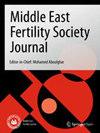The efficacy of luteal phase support in women with polycystic ovary syndrome following assisted reproductive technology: a systematic review
IF 1.3
Q4 REPRODUCTIVE BIOLOGY
引用次数: 0
Abstract
Polycystic ovary syndrome (PCOS) is a complex endocrine condition prevalent among a significant number of women during their reproductive years. Remarkably, 90–95% of women seeking infertility solutions due to anovulation are diagnosed with PCOS. Luteal phase support (LPS) is a crucial aspect of assisted reproductive technologies (ART). This systematic review aimed to evaluate the effectiveness of LPS in women with PCOS undergoing ART, with a focus on pregnancy rates as the primary endpoint. A systematic search was conducted on EMBASE, PubMed, and Scopus databases without language restrictions. We searched for studies up to August 1, 2023. The search strategy used terms related to PCOS and LPS. Clinical trials and cohort studies involving infertile women with PCOS undergoing ART were included. The Risk of Bias 2 (ROB2) and the Newcastle-Ottawa Scale (NOS) tool were used to assess the risk of bias. The review included five studies comprising a total of 818 patients. The studies used various ovulation induction medications, such as letrozole, clomiphene citrate, and human menopausal gonadotropin, in combination with different forms of progesterone for LPS (oral, intramuscular, and intravaginal). The overall results demonstrated inconsistent efficacy of LPS, with some studies showing significant improvements in pregnancy rates with LPS, while others showed no statistically significant difference. The systematic review suggests that LPS may improve pregnancy rates in women with PCOS undergoing ART. However, the effectiveness appears to be influenced by the choice of ovulation induction agent and the route of progesterone administration. Personalized treatment approaches considering patient response and emerging evidence are essential.辅助生殖技术后黄体期支持对多囊卵巢综合征妇女的疗效:系统综述
多囊卵巢综合征(PCOS)是一种复杂的内分泌疾病,在育龄期妇女中普遍存在。值得注意的是,在因无排卵而寻求不孕症解决方案的妇女中,有 90%-95% 被诊断患有多囊卵巢综合症。黄体期支持(LPS)是辅助生殖技术(ART)的一个重要方面。本系统性综述旨在评估黄体期支持疗法对接受辅助生殖技术治疗的多囊卵巢综合征女性的有效性,并将妊娠率作为主要终点。我们在 EMBASE、PubMed 和 Scopus 数据库中进行了系统性检索,没有语言限制。我们搜索了截至 2023 年 8 月 1 日的研究。检索策略使用了与 PCOS 和 LPS 相关的术语。我们纳入了涉及接受抗逆转录病毒疗法的多囊卵巢综合征不育女性的临床试验和队列研究。偏倚风险2(ROB2)和纽卡斯尔-渥太华量表(NOS)工具用于评估偏倚风险。综述包括五项研究,共涉及 818 名患者。这些研究使用了不同的促排卵药物,如来曲唑、枸橼酸氯米芬和人绝经期促性腺激素,并结合不同形式的孕酮(口服、肌肉注射和阴道内注射)进行 LPS 治疗。总体结果显示,LPS 的疗效并不一致,一些研究显示 LPS 能显著提高怀孕率,而另一些研究则显示在统计学上没有显著差异。系统综述表明,LPS 可提高接受抗逆转录病毒疗法的多囊卵巢综合征妇女的妊娠率。然而,其有效性似乎受到促排卵药物选择和黄体酮给药途径的影响。考虑患者反应和新证据的个性化治疗方法至关重要。
本文章由计算机程序翻译,如有差异,请以英文原文为准。
求助全文
约1分钟内获得全文
求助全文
来源期刊

Middle East Fertility Society Journal
REPRODUCTIVE BIOLOGY-
CiteScore
2.80
自引率
0.00%
发文量
32
审稿时长
45 weeks
 求助内容:
求助内容: 应助结果提醒方式:
应助结果提醒方式:


